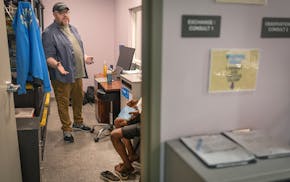Trish Bremer stood in a sun-drenched room, a big window behind her and a cluster of cozy furniture nearby. Soon, people facing mental health crises will be able to get help in this pastel-toned space — absent the feeling of confinement that can accompany hospitalization.
"A place like this doesn't really exist," said Bremer, a senior project manager for Dakota County.
Bremer was showing off the Crisis and Recovery Center, a spacious building just off Robert Street in West St. Paul. A Feb. 3 ribbon cutting will mark the project's completion — and cap a yearslong effort to expand mental health services in Dakota County characterized by pockets of pushback and similarly strident support.
"This is a type of care that is really needed in the community," said Emily Schug, the county's deputy director of social services. "But we're not resourced statewide for these services in a way that really meets the need."
A shortage of psychiatric beds has long plagued Minnesota. Several factors, including relatively low payments from insurance companies to hospitals for mental health treatment, can leave Minnesotans languishing as they await psychiatric care.
The West St. Paul center aims to change that. The $14.1 million building, which relied on county, state and federal funds plus donations, is a partnership between Dakota County and Guild, a St. Paul-based nonprofit. The group has for decades provided short-term and permanent housing to people with serious mental illnesses, including schizophrenia, major depression, bipolar and borderline personality disorder.
The new building, a 15,000-square-foot space with dark wood details and wide hallways, will replace three aging, Guild-run supportive houses in South St. Paul. It's located just a few hundred yards from Dakota County's Northern Service Center and divided into two parts.
On the right side, a county-run area with room for two staff members, called "Place to Go," will connect visitors to immediate resources.
"Because in the moment, do any of us really know what we need when we're in crisis?" Guild CEO Trish Thacker said.
Guild will manage the rest of the building: 16 bedrooms with private bathrooms for people requiring days- and months-long stays.
Just off a hallway of residences is a high-ceiling great room, with a flat-screen TV and fireplace facing a roomy leather couch. There's an art room that doubles as a small gym and an elevator that opens onto a sunny second floor.
"The spaces are really welcoming," Thacker said.
Bremer, the project manager, said staffers visited a similar center in Rochester for inspiration. One intentional aspect of the design: Only a small waiting space separates the county's space from Guild's residential wing.
Say someone visiting the county side needs a safe place to stay for a few nights.
"They can just walk across the vestibule, and the intake room is right there," said Ericka Hammer, Dakota County's adult services program coordinator.
As for payment, people who receive care will have their insurance carrier billed, Thacker said. Guild's Chief Clinical Officer John Adams added the nonprofit can accept uninsured patients and subsequently connect them to coverage.
Staffing levels will remain robust, too. Adams said eight people will work at Guild's 16-bed space during the day, including nurses, counselors and peer support specialists. Staffing will shrink to four people in the evening and two overnight.
Badly needed resource
Sara Hillstrom felt immediately accepted when she arrived at one of Guild's South St. Paul houses about a decade ago.
Frequent moves disrupted her childhood, and she spent her teenage years in and out of a residential treatment center and group home. After graduating high school, she thrived for years working at Target.
But an abusive relationship soon wrecked her mental health, sending her down a difficult path that climaxed one night in hospitalization. Hillstrom recalled staffers at a Minneapolis hospital strip-searching her and peppering her with a "zillion" questions before telling her they didn't have any open psychiatric beds.
The nearest one? North Dakota.
But Guild had room. Hillstrom remembered arriving at one of the houses in South St. Paul around midnight, where a staff member swiftly showed her to a bed.
"She was so kind," Hillstrom said. "She just reassured me that I was safe. That I can just go to bed and we'll do the intake in the morning."
She stayed there for two weeks, then leaned on a Guild social worker for years. Today, she lives independently in West St. Paul with her black cat Onyx and collection of books. Guild, she said, gave "me that reassurance that I can do things on my own."
Years later, she testified to the power of Guild's approach at a 2022 meeting about the planned West St. Paul crisis center, hoping to win over those averse to living near a treatment facility — and to erode misconceptions about mental illness.
She said she's thrilled the project came to fruition.
"I am so excited for more people to be helped," she said.
The first residents will arrive Feb. 10, when people currently living at the South St. Paul houses are scheduled to settle into the new building.
More residents will surely follow. Adams said there's already a wait list.

Trump races to fix a big mistake: DOGE fired too many people

St. Paul sees 'unprecedented' day care closures, sending families scrambling

One man dead in shooting Friday outside Northtown Mall in Blaine

Four arrested, no one injured in fighting and shooting following Burnsville High School graduation

